
Behind Gordon Ramsay’s booming voice and razor-sharp insults lies a darker truth the public rarely sees—a truth that nearly unraveled Hell’s Kitchen and pushed its star to the edge. While millions tuned in weekly to watch chaos unfold in the kitchen, Ramsay was silently battling a reality far more chaotic than anything shown on screen.
During the filming of one of Hell’s Kitchen’s most controversial seasons, production insiders began to whisper about a “different energy” on set. Ramsay wasn’t just angry—he was exhausted, volatile, and, at times, strangely detached. What many fans thought was a deliberate act was, in fact, a man unraveling under pressure.
The season in question—never publicly confirmed but widely speculated to be Season 16—was plagued with behind-the-scenes issues: two contestants allegedly suffered breakdowns off-camera, crew turnover reached a record high, and Ramsay himself reportedly walked off set on multiple occasions. While producers kept the show’s glossy image intact, those who were there say something was wrong.
So what happened?
According to leaked conversations and former production staff, Ramsay was growing disillusioned with the show’s direction. He felt trapped in a formula that demanded louder outbursts, crueler critiques, and increasingly staged drama. It wasn’t cooking anymore—it was theater. And Ramsay, a man who built his empire on culinary excellence, began to feel like a performer in his own nightmare.
The breaking point reportedly came when one contestant—struggling emotionally—was encouraged by producers to remain on the show for dramatic value. Ramsay was livid. He confronted the crew, insisting that mental health had to come before ratings. The footage of that confrontation was buried. The public never saw it.
From that moment on, the energy shifted. Ramsay, who had always been known for controlling the kitchen, suddenly found himself losing control of the narrative. His trust in the show’s editing team eroded. Scenes where he offered genuine mentorship or vulnerability were often cut in favor of explosive soundbites. “They want the monster, not the mentor,” one source recalled him saying during a late-night production meeting.

His personal life was also suffering. During this same period, Ramsay was dealing with mounting stress at home. He rarely saw his wife or children. One of his restaurants overseas was under investigation for financial mismanagement (a matter later resolved, but damaging nonetheless). The Gordon Ramsay brand was expanding faster than he could manage it, and Hell’s Kitchen—once his flagship—had become his prison.
At one point, Ramsay reportedly demanded the show be restructured or he would walk. Executives scrambled. New contracts were negotiated. More creative input was promised. But the damage was done. Ramsay never viewed the show the same way again.
Since then, he has diversified his TV presence, leaning into friendlier formats like MasterChef Junior and travel-based food shows where his true personality can shine. He smiles more. Yells less. But in the quiet corners of his career, Hell’s Kitchen still casts a shadow.
Fans continue to watch the drama unfold on screen, but few realize the cost. The show that made Gordon Ramsay a global star nearly shattered him behind closed doors. And while the kitchen may be fiery, the truth behind the flames is colder—and more haunting—than anyone expected.